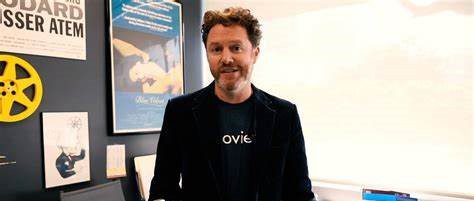Let’s talk dating apps. I’ve never used one, and I don’t think I ever will, and I am 100% okay with that. I have seen too many friends use them and watched too many horror films about them to ever deal with amount of crazy. I prefer less bullshit and try to stay away from situations where I could potentially be catfished. My feelings about this were validated after catching Elric Kane’s The Dead Thing via Fantasia International Film Festival this year.
A young woman lost in a series of meaningless connections falls in love with a charismatic and sensitive man, who hides a dark secret that turns her affair into a dangerous obsession.
To celebrate the film’s world premiere at Fantasia, I chatted with Elric about the inspiration behind the film, sex scenes in movies, horror movies, and more!
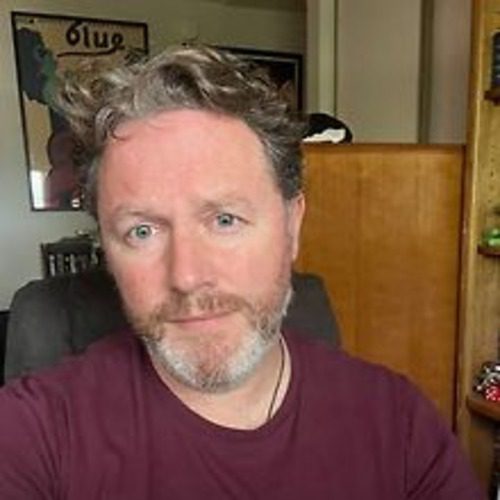
PopHorror: Hi Elric, how are you?
Elric Kane: Good, a little tired. We had our premiere last night, so it was a late night afterwards.
PopHorror: How was that?
Elric Kane: It was amazing because we had maybe like 10 of the cast and crew come and a lot of the cast had never seen it. I found out that the actress had watched it… When she had watched it before, she had just been muting herself every time she spoke. I was like, “So this will be a whole different experience for you then.”
PopHorror: Oh, my goodness! That segues into my first question because people are saying this is your directorial debut, but you’ve directed some smaller things before, and it’s premiering at Fantasia, which is one of the best out there. How does that feel?
Elric Kane: When you make something, and I think some people will come into a horror movie wanting big H horror like everything scary. I’m someone who’s been covering horror movies for a decade, so I understand that expectation too, but I also like heart horror. I like movies that are about the heart and the drama and so when you make that – I’m not saying it’s a risk because it’s what you want to make – but you know that you still have to connect to someone, and you have no idea. Once you finish, that’s where you really do give up control so when I got the email from them, it wasn’t just, “You’re in to this festival!”, it was this beautifully written, fully connected email that made me say even if I’d gotten into a con, I probably wouldn’t have gone because I’d go, “I must show at Fantasia!” because the way they responded was so personal and when you make something that feels personal, you do hope that that’s the response, and you know you’re not going to get it all the time so you almost want to frame it. It really felt special and I’d never come here because I’ve been doing these podcasts for so long. Sometimes festivals will invite us and I got to a point where, I’m not down on myself but about filmmaking where I’m like, it’s so much harder to get a film made in America, to me. Festivals that I most want to go to? I’m not going to ever go to as a podcaster and until I make a movie, I won’t go. So I haven’t been to Fantastic Fest, I haven’t been to Fantasia, I haven’t been to Sitges. The ones that I would dream of, I just have never. For that reason alone, getting up there and introducing and seeing the actors and people really see their work on a screen is so different. Like we’re talking on a Zoom, that’s how I’ve been watching my movie for a year and half of being on a computer screen. Actually, thrilling I would say.
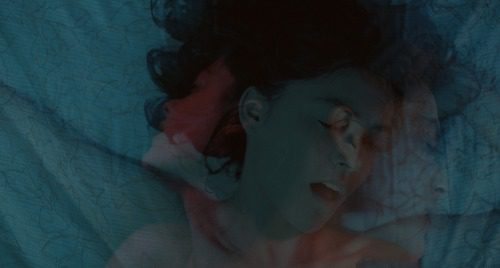
PopHorror: Yeah! Look at you now! You held out on doing the festivals that you love and wanted to do, and now you’re premiering at Fantasia! That’s just amazing, congratulations!
Elric Kane: It’s a good motivational tool if somebody’s looking for one, to make sure you keep at it. It’s never too late either. In this life, thankfully, we have the ability to pivot and try to redefine what we want people to see us as.
PopHorror: What inspired the story and how did the project come about?
Elric Kane: Me and my writing partner – his name’s Webb Wilcoxen – we had written a very dark adult, almost cosmic horror film with a lot more practical effects and stuff that I was going to be my first film. For a few years I thought that would be it and we just realized, oh man, how do you find the money for something like that? At one point I thought, why don’t we write something more stripped back, more pared down that we could actually do? I had this note on my phone – any creative will just have random notes or one lines or titles – that just said “dating app horror ???” for like three years. I didn’t even look at it again. I was like, oh that’s interesting. There was a secretary where I worked and every single day I would go to work – I teach film and she was a school secretary – she was going on different dates almost every night. Different dating apps and very strange ones, not weird sexually but like Donuts with Coffee and Back of the Taxi Where Two People Meet and Take a Ride Together. She would explain them and they were always funny, her stories. She was a very funny person. But they really got into my head, and she was probably going almost every night, so I was like, you’re in this constant movement to try to connect with somebody. It’s not just an app and it’s not just your phone, it felt like a very disconnected thing that the modern dating pool is. It got into me at some point and then at some point it kind of started building, almost trying to think of a new urban legend. We know all of the old urban legends. I’m like, if our movie ends, a new urban legend could be from it like, “Did you hear about that girl and she started dating this guy and then found this out and this out?” I’m trying to be spoiler-free a little bit but, “And then this happened and this happened,” and you’d be like, wow, this sounds like a modern urban legend, so we kept going back and forth and kind of one-upping the colonel. I really like movies that are super close and focused on the performers, whether it’s a Bergman film… There’s all these kinds of movies where you’re often really close to the characters and I thought it’d be fun to try making something where she’s in almost every shot. You’re really right there with her so people start to feel what she feels. Style’s always part of my writing. I’m less the writer/writer. He’s more the writer/writer and I’m more the “This is the stuff I want to see, let’s get it in the script.” It kind of came about from that. But I do hope 10 years from now, if people look back, I think they might go, “Oh, that’s an interesting version of what that decade’s urban…” A kind of play on an urban myth or something.
PopHorror: Speaking of the script, was there anything that you were adamant about keeping in the film, no matter what?
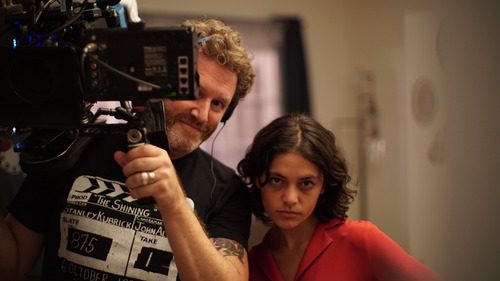
Elric Kane: Yes. The good thing about making this as an independent film, so no one can really tell us to do anything. At the end, I guess somebody could. There’s a lot of talk in the conversation about sex scenes in movies and that kind of stuff. This film is kind of built on a couple, but they’re not traditionally shot. They’re much more focused on just her face. If this was being made for a studio, I could imagine someone giving the note, “Yeah, let’s just cut those out for certain territories.” It is the movie. It is a huge part of the emotional and psychological landscape of what it is because this is about toxic relationships and being consumed. That would be something I can’t imagine cutting out. The tone does change. We had some stuff where maybe the dark love interest character was doing certain things that were maybe more playful, maybe scarier. There’s a version maybe, of the script, that would be a scarier movie, but I think if I went that direction, it wouldn’t be as realistic and maybe emotional. At some point, you almost have to make a choice, like if I do the next thing, I’d be like, eh I should push more to do a scary thing because this is almost a sad thing than it is a scary thing to me. And that’s fine. But just knowing that I had to make those choices and luckily didn’t have anyone forcing me to do anything.
PopHorror: I have to say that I appreciate the sex scenes and keeping those in there because I feel like those do make it more realistic. Taking them out kind of sterilizes it a little bit.
Elric Kane: Yeah, yeah.
PopHorror: With dating apps being so prevalent now, there’s a lot more usage of them so you have to be more realistic. They’re not just going out and having dinner and going home all the time. There are going to be those one-night stands and those one-offs mixed in with just going to dinner. So the sex scenes make it feel more authentic rather than so PG-13. The horror genre has evolved over the years and has become a box office powerhouse. Why do you feel that so many people feel connected with horror?
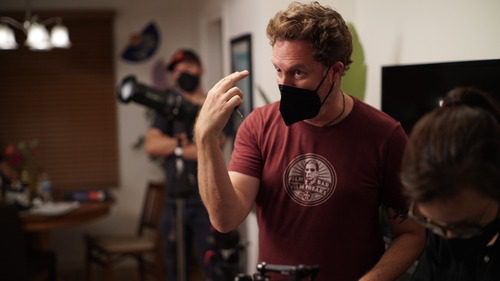
Elric Kane: That’s a great question. Like you, I’ve been doing this kind of thinking for so long. I think it’s a very safe way to experience extreme things for one, and I think for me, I was a very scared of the dark kid, and then saw horror films and was even more scared initially, like for the first couple of years of seeing horror films. Like, oh my god. And at some point, that changes and you actually do feel very empowered. When Wes Craven was like it’s a pressure valve to release the bad stuff. I’ve never met a horror person, like the great horror people that we’ve all maybe met, who’ve been a weirdo sicko, like ever. Like all the great people I’ve ever met, the Wes Cravens, they are the nicest people and I think outside the horror community that might not be the perception. I truly believe it’s our therapy. It’s our release. That explains the wanting to do it. In terms of the popularity, I do think horror’s always done a great job of not just satirizing, but reflecting the reality of where we are. Like I don’t want to watch the news right now. The news is horrific right now. I don’t want to watch that but if there’s a horror version of that, I can kind of play in that well. I think we’re just… Who knows exactly what… I’m more interested in what are the people that don’t like horror? What are those people… Why don’t they like horror? It would be interesting to me because it’s hard to answer from inside. I think it’s so cyclical too, like our stories, whether they’re zombies, they’re perfect for certain eras and then they go out of vogue for a while then they come back and are perfect reflections. I think that’s the other thing. Every few years people are like, “Horror’s dead!” and then suddenly it’s the only thing doing well at the box office. Like it’s buoying the whole box office. I get very excited personally, when I see something like Longlegs, which had great marketing, a very abstract in a lot of ways movie, that uses Silence of the Lambs to say, “Hey, you all know what this is. Come see the movie!” And then it gets really weird and I’m like, “This is great!” And it made money. That makes me have a lot of confidence in the ability of horror of all kinds to do well. It’s not just teen films, which sometimes we get lost in just the teen stuff.
PopHorror: People who say horror is dead are not aware of all the great independent films that are out there, and that could be that they’re just not interested, or they just don’t have access to them. Horror has never been dead, it’s always been there, it’s just they’re looking for the box office or the theater. They’re not looking closer to home where we have all these really great tiny independent films.
Elric Kane: Yeah!
PopHorror: That makes me sad.
Elric Kane: I remember seeing maybe eight years ago now or so, like when I saw The Battery by Jeremy Gardner. It’s like a six- or 10,000-dollar zombie movie and it had legs and got seen by a lot of people and got people excited about making movies. Even my film, when you know it’s not for everyone. You’re making something, you can’t make a movie for everyone. It’s pretty much impossible. I’d rather a couple people be obsessed by it like, “I totally got your movie!”, and then somebody else goes, “Eh, it’s not that fun.” That trade off, even though I’ve got to wear my armor now that the reviews, but I do embrace that and I think that’s what independent films do. I was very inspired by people like Larry Fessenden. Larry Fessenden making his movies his way twenty-odd years ago when he first started. If you connect with someone, you’re probably going to connect pretty deeply. And indie films, they feel more like our lives than bigger movies because they’re a bit more stripped down and realistic.
PopHorror: A lot of times you can see your friends and people you know in them and that makes it even more relatable.
Elric Kane: Exactly, yeah.
PopHorror: One last question for you today. What is your favorite scary movie?
Elric Kane: Hmm, scary… Let’s see. There are so many movies. It’s hard to say now because they don’t scare me, but if I think of the classic ones that are meant to, I think the feeling in Hellraiser is still one of my favorites because it actually makes a lot of sense when I think about my movie and that’s probably where all the feelings are coming from, but that one has adult sexuality and family issues and things from another world. I think the most scared I ever was watching a movie was the first Nightmare on Elm Street as a kid. That was actually really scary to me.
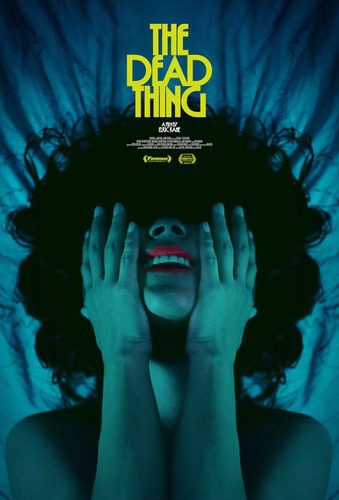
Thank you to Elric for taking the time to speak with us. The Dead Thing is currently in its festival run but stayed tune for release updates!
 PopHorror Let's Get Scared
PopHorror Let's Get Scared
